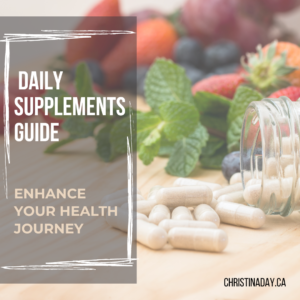Introduction
Welcome to the world of dietary supplements, where we navigate the vast sea of options to help you fill those pesky nutritional gaps. In our health-conscious society, these supplements have become a staple in many daily routines, promising to bridge the nutritional voids left by our modern diets. But with so many choices out there, it’s easy to feel overwhelmed. That’s why we’re here – to dive deep into the realm of supplements and share some key ones that may just make a difference in your life.
Now, before you start popping pills and mixing powders left and right, let’s clarify something: supplements aren’t meant to replace a balanced diet of whole foods. They’re more like the cherry on top – the extra boost your body might need when circumstances call for it. Supplements fill the gaps where nutrition and lifestyle falls short, ensuring your body gets all the necessary nutrients it craves.
In this supplements guide we will explore which supplements might be worth incorporating into your daily routine, how they can enhace your health journey and make a real difference in your overall health and well-being. Are you ready? Let’s dive in!
(This article contains affiliate links. As an Amazon Affiliate, I earn a commission on purchases made through my affiliate links, at no extra cost to you. I only recommend products that I have used myself, and believe will provide value to my readers. While I am a health care professional, nothing in this blog post or this website in general is meant as medical advice. Please consult with your medical provider prior to taking any of the supplements mentioned).
What are dietary supplements?
So, what exactly are dietary supplements? They come in all shapes and sizes – vitamins, minerals, herbs, amino acids, and enzymes – each with their own special powers to support our overall well-being. Think of them as the Avengers of the nutrition world, each playing a unique role in maintaining our health.
These superheroes can help us meet our daily requirements for essential nutrients or address specific health concerns. Need some extra vitamin C to boost your immune system? There’s a supplement for that. Want to improve your digestion or enhance your sleep quality? Yup, there are supplements for those too.
But let’s not forget the golden rule: supplements are meant to complement a healthy lifestyle, not replace it. They’re like the trusty sidekick who has your back when you need a little extra support. So keep enjoying those nutritious meals, get plenty of rest and sunshine, and exercise regularly, because no supplement can outshine the power of a well-rounded lifestyle.
Now that you have a better understanding of what dietary supplements are, it’s time to explore how they can be incorporated into our lives.
Filling the nutritional gaps
While a balanced whole-foods diet and an overall healthy lifestyle is the cornerstone of good health, there are certain circumstances where vitamins and supplements are required. They serve as a bridge, filling gaps where nutrition may fall short, and ensuring our bodies receive the necessary nutrients.
Who needs supplements? (Target groups for supplementation)
Certain groups of individuals may benefit more significantly from dietary supplements. For example, pregnant women often require additional folic acid to ensure the healthy development of their babies. Older adults might need Vitamin D and calcium supplements to maintain bone health. People with specific dietary restrictions, such as vegans, might require B12 supplements.
Choosing the right supplements (Guidelines for quality and safety)
Selecting the right supplement is crucial. It’s important to look for quality seals or certifications that indicate testing by independent third parties. Understanding the source of the supplement’s ingredients is also key to ensuring safety and efficacy. Not all supplements are created equal, so it’s important that you read the labels carefully, and choose ones with the least amount of fillers. For example, stay away from gummy vitamins as they often contain sugar, as well as artificial colours and flavours.
In Canada, supplements are regulated differently than pharmaceutical drugs, but that does not mean they are without oversight or standards. Health Canada oversees their safety, efficacy, and quality through the Natural and Non-prescription Health Products Directorate, ensuring they meet specific guidelines before being made available to the public. It is still up to each individual to check the ingredients carefully, to make sure that you are choosing a higher quality product, ingredients you are not allergic to, or if you are vegan, that you are not choosing a product with animal byproducts.
Consulting health care providers
While supplements can offer significant benefits, they are not without risks. Before starting any supplement regimen, consulting with a healthcare provider (family doctor, naturopath) is essential. They can provide guidance based on individual health needs and help avoid potential interactions with medications. Your pharmacist may also be a good source in discussing medication interactions. It’s crucial to approach supplementation with a balanced and informed perspective.
My personal supplements
Here is a list of the supplements that I take on a semi-regular to occasional basis. I do take short breaks and cycle through different ones depending on my body’s need. Taking short breaks from supplements helps prevent tolerance and dependence, reduces the risk of side effects, and ensures the body maintains its natural functions and absorption efficiency. In other words, don’t beat yourself up if you forget to take them sometimes, that’s actually a good thing! The ones I take almost every day are Vitamin D (especially in the winter) and Omega 3, the others I take on an as needed basis.
Vitamin D3 – most of us don’t get enough of this important vitamin that helps boost our immune system and help our metabolism. Some experts recommend taking 5000 IU (Steven R. Gundry, 2021), while most health care professionals recommend 1000 IU for healthy individuals. My recommendation is to have your blood work done to check for a vitamin D deficiency, and supplement accordingly as per your doctor. However, just know that you will get the biggest bang from your buck by getting at least 20 minutes of direct sunlight (not through a window) every day. (Buy on Amazon)
C3 complex turmeric curcumin – anti-inflammatory, antioxidant, antiangiogenic (defense system against cancer cells) and pro-regenerative properties (William W. Li, 2019). (Buy on Amazon)
Omega 3 fish oil – omega 3s help balance your hormones and reduce inflammation, support mental and behavioural health, reduce insulin resistance, support overall health and disease prevention (Amy Shah, 2021). Ideally, you want to eat fish such as wild salmon or mackerel at least twice weekly, as well as plant sources of omega-3 fatty acids such as flaxseed, chia seeds and walnuts every day and only supplement occasionally. (Buy on Amazon)
Zinc – helps boost your immune system and metabolism (Mayo Clinic, 2020). Food sources of zinc include oysters, red meat, poultry, chickpeas, pumpkin seeds and mushrooms. Zinc from animal sources is more bioavailable than from plant sources. (Buy on Amazon)
L-Glutamine – helps suppress pro-inflammatory signalling pathways, helps heal leaky gut by sealing tight junctions, supports thyroid function and controls sugar cravings (Elroy Vojdani, 2021). Food sources include beef, chicken, eggs, almonds, lentils, and spinach. (Buy on Amazon)
Ashwagandha –anti-inflammatory, relaxes the nervous system (helps with sleep), protects the body against chronic stress (it’s an adaptogen), protects against free radicals, boosts the immune system, stabilizes mood, improves learning memory and mental sharpness (Amy Shah, 2021). There are no food sources of ashwagandha, but meditation, grounding and other relaxation techniques may have similar effects. (Buy on Amazon)
Sisu Cold & Flu Rescue – this one is the latest addition to my cold season arsenal (along with vaccines, proper hand washing and all the usual things I would do). This past winter was the first time I did not get sick at all. I would take this as soon as I got a bit of a scratchy throat or someone around me was sick, and it seemed to work. This is a hard one to find, but I have had luck at well.ca.
Magnesium – Magnesium is critical in many body functions including improving metabolic health (may reverse insulin resistance by getting sugar out of your bloodstream and into your muscle cells where it belongs) and improving sleep (Steven R. Gundry, 2021).
Not all magnesium supplements are created equal, so this one is a really important one to choose wisely. Bioptimizers Magnesium is the best one I’ve come across so far, although it’s pretty pricey to get shipped to Canada. Other reputable brands are SISU (buy on Amazon), CanPrev (buy on Amazon) and Jigsaw Health (buy on Amazon).
There are several types of magnesium supplements, each with unique benefits, including the following:
- Magnesium Chelate: This form is bound to amino acids, making it highly absorbable and beneficial for muscle health and recovery.
- Magnesium Citrate: Known for its laxative effect, it is often used to treat constipation and improve digestion.
- Magnesium Bisglycinate: This chelated form is gentle on the stomach and is commonly recommended for managing stress, anxiety, and improving sleep quality.
- Magnesium Malate: Combined with malic acid, it supports energy production and is sometimes recommended for those with fibromyalgia or chronic fatigue syndrome.
- Magnesium Aspartate: Involved in DNA synthesis and supports nerve function.
- Magnesium Taurate: This form is thought to benefit heart health and help regulate blood pressure.
Gutsmart prebiotic/probiotic – this powder is perfect to add to your morning smoothie and is great for your gut buddies (those beneficial gut bacteria that keep you healthy). Prebiotics are non-digestible foods such as dietary fibre that our healthy gut bacteria need in order to thrive. Food sources include Jerusalem artichoke, garlic, onions, and asparagus. Probiotics are beneficial bacteria that provide various functions for the body such as immune system support and improving mental health. Food sources include fermented foods such as yoghurt, pickles and sauerkraut. (Buy on Amazon)
Inulin – prebiotic soluble fibre that feeds your gut buddies and adds a tiny bit of extra sweetness to your food (perfect in your morning smoothie) without spiking your blood glucose levels (Steven R. Gundry, 2021). (Buy on Amazon)
Bee pollen – this superfood is rich in essential nutrients like proteins, vitamins, minerals, and antioxidants, which support overall health and well-being. It exhibits anti-inflammatory, antimicrobial, and antioxidant properties that enhance immune function, improve cardiovascular health, and promote wound healing (Kacemi & Campos, 2023; Bakour et al., 2023). It also aids in digestive health and energy metabolism, making it a versatile functional food for various health benefits. They do pose a higher risk of allergic reactions compared to other supplements, so definitely take with caution. (Buy on Amazon)
Conclusion
In conclusion, while supplements can play a beneficial role in filling nutritional gaps and supporting overall health, they should be used judiciously and in conjunction with a balanced diet and overall healthy lifestyle. It’s essential to make informed choices based on quality of the products since not all supplements are created equal, and to consult healthcare professionals for personalized advice.
If you would like to work with me, schedule your free consult here.
References
Amy Shah, M. (2021). I’m so effing tired. Boston: Houghton Mifflin Harcourt.
Bakour, M., Laaroussi, H., Ousaaid, D., El Menyiy, N., Hano, C., & Lyoussi, B. (2023). Bee pollen as functional food: Insights into its composition and therapeutic properties. Antioxidants, 12(3), 557. https://doi.org/10.3390/antiox12030557
Elroy Vojdani, M. (2021). When food bites back: Taking control of autoimmune disease.
Hollis, B. W., & Wagner, C. L. (2013). Vitamin D and pregnancy: skeletal effects, nonskeletal effects, and birth outcomes. Calcified tissue international, 92(2), 128-139.
Kacemi, R., & Campos, M. G. (2023). Translational research on bee pollen as a source of nutrients: A scoping review from bench to real world. Nutrients, 15(10), 2413. https://doi.org/10.3390/nu15102413
MayoClinic. (2020, November 17). Retrieved from https://www.mayoclinic.org/drugs-supplements-zinc/art-20366112#:~:text=Zinc%2C%20a%20nutrient%20found%20throughout,body%20usually%20gets%20enough%20zinc.
Steven R. Gundry, M. (2021). The energy paradox. New York: HarperCollins Publishers.
William W. Li, M. (2019). Eat to beat disease. New York: Grand Central Publishing.
Disclaimer
The information provided in this blog post is for educational and informational purposes only and is not intended as medical advice. While I strive to ensure the information is accurate and up-to-date, the field of dietary supplements is continually evolving. Therefore, readers should not use this information as a substitute for professional medical advice, diagnosis, or treatment.
Before adding any supplements to your diet, it’s crucial to consult with a healthcare professional to ensure they are appropriate for your individual health needs and conditions. This is especially important for individuals who are pregnant, nursing, have existing health conditions, or are taking prescription medications, as supplements can interact with medications and affect their efficacy.
The views and nutritional advice expressed in this blog post are not intended to be a substitute for conventional medical service. If you have a severe medical condition or health concern, see your physician. Supplements should be taken as part of a balanced diet and healthy lifestyle. The author and publisher disclaim any liability directly or indirectly from the use of the information contained in this blog post.



Great content, thanks for posting.